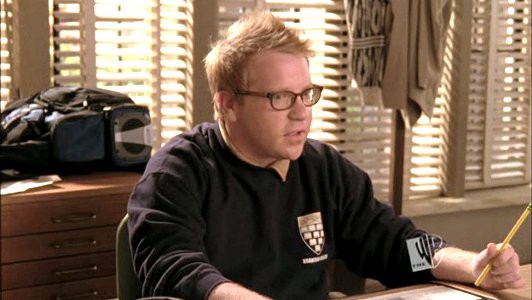How Gilmore Girls Do Money: Glenn Babble

Glenn stayed late to create the beat sheet. He spent his first chunk of work scrolling Tumblr, the reblogged gifs comforting in their predictability, letting the internet soothe him as it always did. He could hardly fall asleep, now, without an hour of scrolling beforehand.
Then he started thinking about the task ahead of him. It wasn’t necessarily hard, but putting words down always made him nervous in a way that would have worried him, except his boss said he always got nervous too — and Coldwater Inn was already in its third season. This is just what writers did. They got nervous. They drank. They spent hours watching television.
“None of it is time wasted,” his boss had said, and Glenn didn’t feel like he was wasting his time, but he was already daydreaming about the next stage in his own career, the script that he would write over the next hiatus, the little notebook filled with short phrases like “Tallulah and Tally fall for same guy, create in-home Olympics to decide who asks him out.” He felt embarrassed the next day, looking back at these ideas, but he put circles around the ones he thought might work before closing the strap on his notebook and slipping it into his pocket.
His idea was pretty simple: as was his working title: The Lulus. (He felt embarrassed about that, too.) An Ivy League-educated Millennial tries to make it as a journalist, then finds herself boomeranging back to her mother’s small-town home. There’d be a third generation, too; a newly widowed grandmother. A mild illness, maybe — or some kind of financial difficulty — requiring all three women to live together. Like a multigenerational Golden Girls. That show had been so popular. He could still remember jokes from when he was little, watching Golden Girls in the mornings on the days he was sick and had to stay home from school.
But it would be Lulu, Tallulah, and Tally, and he could picture the title sequence: three nesting dolls popping out of each other, slightly animated with human faces. It was that image that kept him going, and the thought of getting to recreate something as comforting as the shows he had watched when he was a child.
That’s why he had wanted to work on Coldwater Inn instead of one of the procedurals or crime shows; the most frightening thing on Coldwater was the Roaring Twenties. It was designed to be viewed with a glass of red wine, snuggled up in a blanket, imagining how you would look in the characters’ clothes. Nobody ever got murdered or assaulted; the worst thing a character could have was debt. The characters talked about their debts the same way that the Coldwater assistants did; in the bar, with an air of “well, we can’t do anything about it, so we might as well enjoy ourselves.”
But if Glenn became a showrunner, whether it was on The Lulus or on something else, he’d earn more money. That was the other thing that kept him going. He had seen his boss’s life, and how different it was from his own, and knew that he could work his way there. He had his foot in the door now; he had done his stint as a PA, he knew showrunners by name, and he could see the path he needed to follow. It was like the beat sheet he was currently trying to write, except it was already drafted.
Glenn began typing. He knew where the story would go. He knew where his life would probably go. He was nervous — he’d always be nervous — but he knew what he was doing, and he knew how to take an episode to its end.
Previously on “How Gilmore Girls Do Money:” Paris Geller and Doyle McCaster
Support The Billfold
The Billfold continues to exist thanks to support from our readers. Help us continue to do our work by making a monthly pledge on Patreon or a one-time-only contribution through PayPal.
Comments